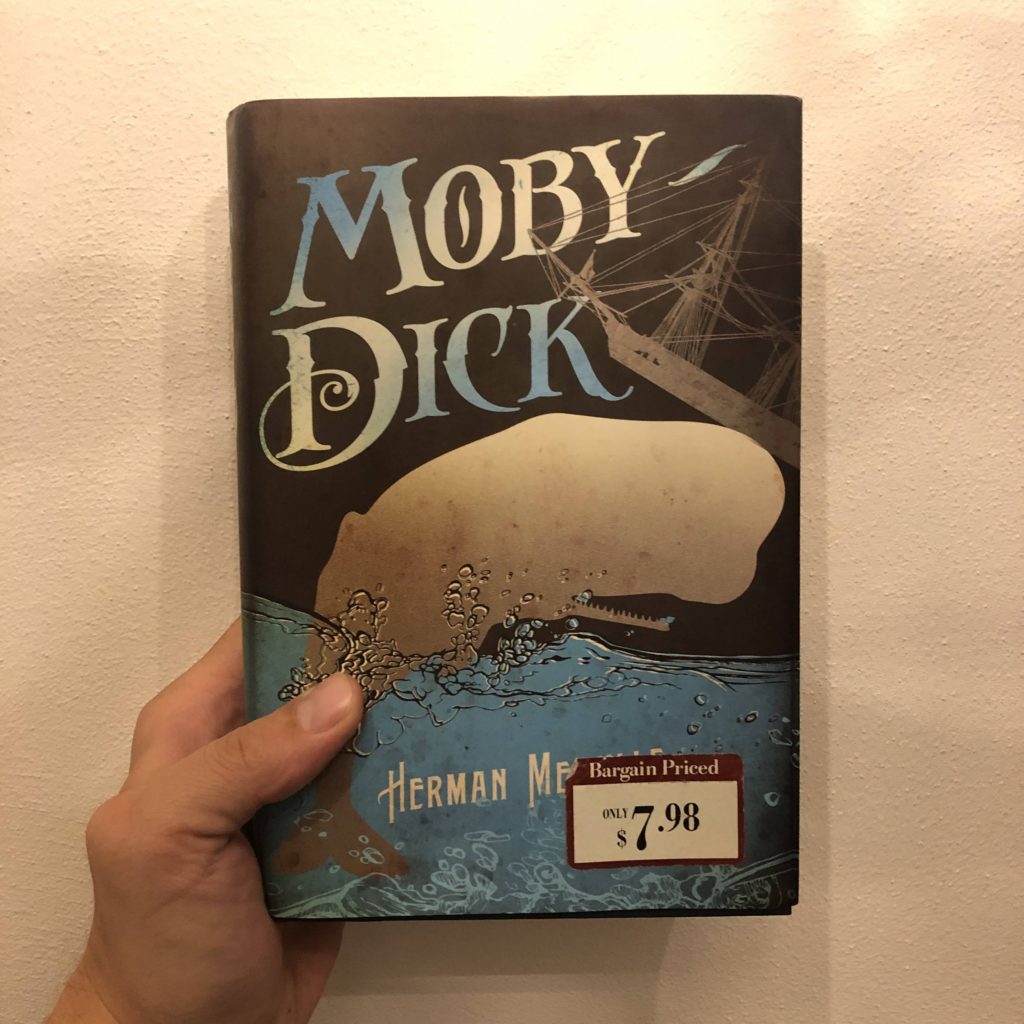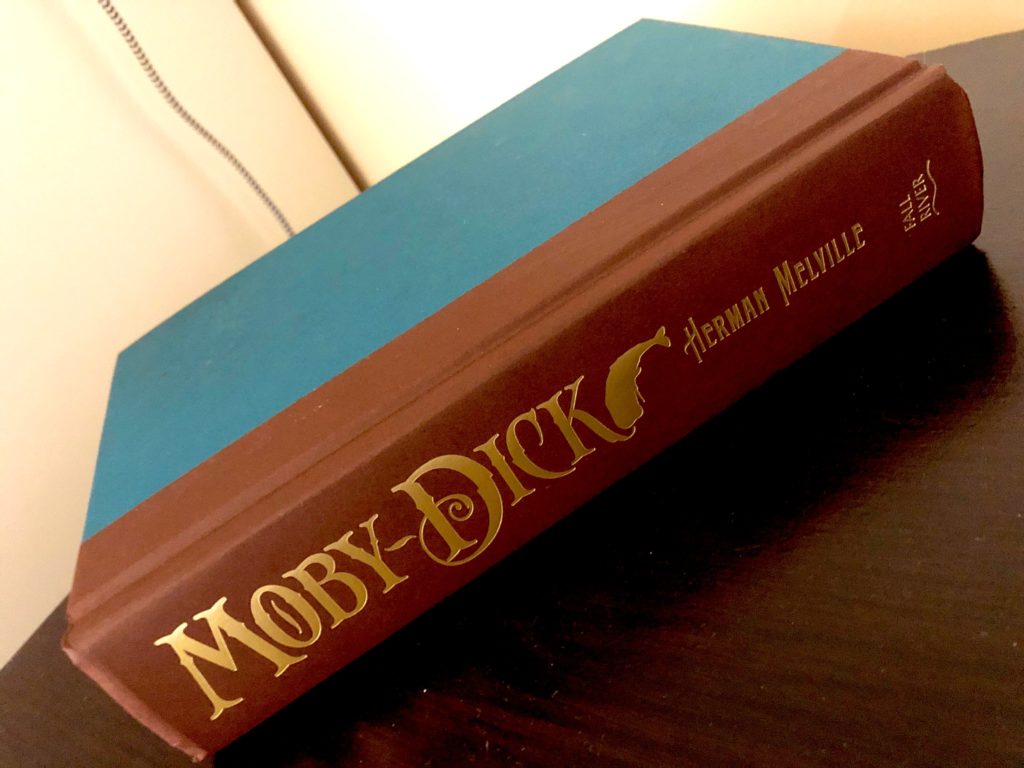I suspect Moby-Dick — the quintessential Great American Novel — has the curious accolade of being one of the most famous books ever, while also being one of the least read books. Its reputation greatly exceeds its appeal. Nonetheless, I had always wanted to read this extraordinary 170 year old book. And now that I did, I think I understand its reputation as well as I understand the incongruent appeal.
Moby-Dick stats
Moby-Dick clocks in around 650+ pages and 212,000 words. It’s not a small book but it’s also not the biggest book I ever read. But it was definitely one of the hardest, and one that demanded a dedicated and focused effort to finish.
Long story short: reading Moby-Dick is hard work and it’s not exactly the most riveting thing I ever read.
It doesn’t keep you on the edge of your seat. Surprisingly very little happens for such a big book. You can summarize the entire thing in one sentence (yes, I’ll get to the allegories later).
That is not to say that this is not a smart book. Herman Melville’s IQ probably bordered on genius and he pulled out all the stops with Moby-Dick. However, those two things don’t necessarily make for a good book. Why is it then than Moby-Dick is so revered? I can think of a few things.

Words, just so.many.different.words
Melville’s dictionary must be the most abused book ever. Because if there was an Olympics for using the most different words, Herman Melville would win first, second and third place. This is actually a scientific fact: “About 44% of the distinct set of words in this novel occur only once”
Read that again: 44% of all words in Moby-Dick are used only once.
If you don’t believe me just open this book on any page and you can tell this right away. Moby-Dick is not like any other book.
It is divided in 135 small chapters — and one very important epilogue — each chapter deals with a dedicated subject. And it seems Melville took it as an exercise to fill each chapter with as many different words as he could. Not only that, he likes to use long, half page long rambling sentences. There is also an enormous variation in style per chapter; from dialogue to scientific descriptions to inner thoughts to poetic or philosophical or almost theatrical treaties. And to top it all off, this is all done in English from 170 years ago. Just to give you an idea of what a chore it is to read.
And all of these things are reasons Moby-Dick stands out among other books. Another is because it’s about whaling.
Whaling
Whaling in the 19th century was astoundingly difficult and fantastical venture. If I hadn’t known about it and you would explain it to me I wouldn’t believe you. People actually set out on wooden ships for three or four years and just randomly sail around the world until they found some whales?! Whales that are actual leviathans and that can kill any man in an instant? And when they do spot these whales, they set out on even smaller wooden boats to try to harpoon these 100 foot creatures, BY HAND?! Surely this is all made up! This cannot be real! But it is.
Whaling is an absolutely insane endeavour. And this makes it a terrific backdrop for a story.
I would like to argue no man before or after has know more about whaling than Melville. He not only writes from his own experiences as a whaler, he also had probably read everything ever written (at that point) about whaling and whales. And he uses all this knowledge to bombard the reader with more facts than your brain can handle, about whaling, whales and whalers.
He also shares detailed glimpses of 19th century Nantucket life. Which makes this book a time-capsule of the American spirit. These are reasons this book is so revered in the English speaking world. So much so, that it is regarded as the definitive Great American Novel.
Even though the book suffered greatly from negative reviews and criticism about alleged blasphemy. And it wasn’t until a good 70 years later that Moby-Dick started to be regarded as the classic we now all know. (But this is a story by itself).

Allegories
On to the good parts. Moby-Dick is not really about the demonstration of Melville’s mastery of language or even about whaling. These two things make it unique, but what makes it good is what is under the surface (see what I did there?).
This book is absolutely brimmed with allegories, allusions and metaphors. Some small, some encapsulate the entire plot, some are even displayed by the book’s structure.
The most clear-cut one is of course that the whale Moby-Dick represents fate itself. But there are many more. Philosophical or contemplative of nature. You can talk and discuss and debate on this endlessly.
Meta
There is one meta-allegory I particularly like. In Moby-Dick we read about a whaler, Ahab, that sets out to kill this mythical monster Moby-Dick, a sperm whale he lost his leg to previously. We as a reader slowly get to experience how this whaler goes maniacally insane and takes his crew with him. Until they all go under.
In a sense this is about Melville himself and his experience and difficulty writing this book! And we, the readers, are the crew.
This is just one take. But there are many more direct allegories, about names, stories and references. Specifically the boats and captains Ahab and Ishmael meet along the way, are loaded with biblical references and meaning. I am sure I probably missed a whole bunch too. Melville uses these narrative devices to deal with many different themes. And it is exactly this what sets Moby-Dick apart from other books. There is a score of things that aren’t said, but implied.
My copy of the book ends with a couple of letters from Melville about his book and his struggles in getting it published. Right after the letters the book, oddly enough, shares a couple of very negative reviews from the time of publishing. I am not sure why they are in there. Maybe to demonstrate that people did not recognize the genius at once? Or how remarkable it is that this book still became a classic? I am not sure.
Conclusion
All in all Moby-Dick is a distinctive and unique reading experience detailing a story about a very specific time and endeavour. And I can now boast “I read Moby-Dick”, and I am glad I did but I will also say I didn’t really enjoy reading it all that much.
I think I understand what Melville set out to do and I admire his genius. I also think I understand the appeal of this book 170 years later. This book makes you work and that is not a problem, but there were times that I really had to force myself, and that does not happen to books that are favorites of mine.
Melville was a genius wordsmith and put many ideas in this book for people to contemplate over for generations to come. But as is the case with music, I don’t care how many different notes a guitar player can hit on his guitar in 1 minute, that is not music, that is a demonstration of mastery. In the end it is about what songs this mastery produces. And in this case, I think I wanted to have liked the song more.
Leave a Reply